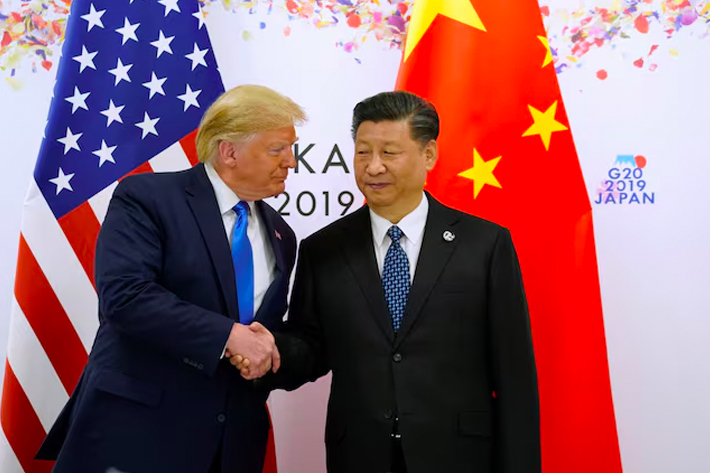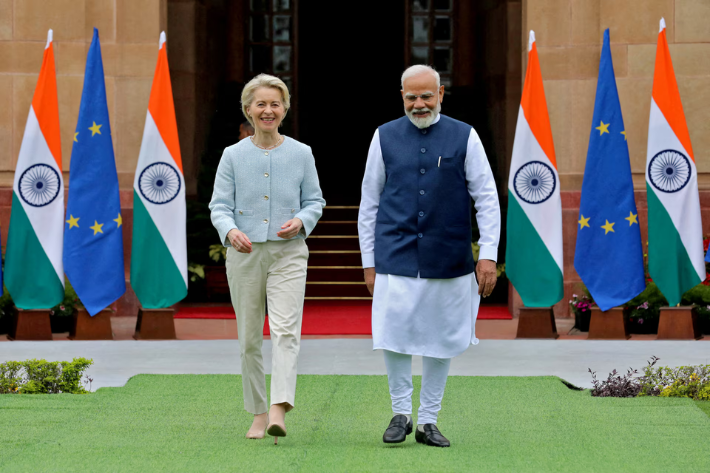US President Donald Trump said on Wednesday that he will speak to Chinese President Xi Jinping tomorrow about Nvidia’s state-of-the-art Blackwell artificial intelligence chip.
Trump is due to meet his Chinese counterpart in the port city of Busan in South Korea, on the sidelines of the Asia Pacific Economic Cooperation (APEC) meeting in Gyeongju.
US and Chinese officials said on the weekend they had agreed on the framework of a bilateral trade deal before the two leaders meet. But sales of the US firm’s high-end AI chips to China, which accounted for 13% of its revenue in the past financial year, have been a key sticking point in protracted talks between the world’s two largest economies this year.
ALSO SEE: Japan Signs Rare Earths, Nuclear Power Deal With Trump
Beijing has long been irked by Washington’s export controls that ban Nvidia from selling its most advanced AI chips to China. The US has justified these restrictions by alleging that the Chinese military would use the chips to increase its capabilities.
Speaking to reporters aboard Air Force One en route to Gyeongju, South Korea, Trump praised Nvidia’s current flagship Blackwell model as the “super-duper chip” and said he might speak to Xi about it, without elaborating.
“I think we may be talking about that with President Xi,” Trump said, adding he was “very optimistic” about his meeting with Xi, the first since he returned to the White House.
Nvidia poised for $5-trillion valuation
Trump’s comments were one of several factors that spurred a powerful rally in Nvidia’s stocks. The others were CEO Jensen Huang announcing $500 billion in AI chip orders and plans to build seven supercomputers for the US government.
Shares of Nvidia jumped 2.8% in premarket trade, meaning the Santa Clara, California-based chip designer is poised to become the first company with a market valuation in excess of $5 trillion.
The Silicon Valley company has become a key player in the global artificial intelligence boom and the latest milestone comes just months after it hit a $4 trillion valuation in July.
“In many ways, everything that could have gone right for the firm, has gone right over the last sort of 24 hours,” Michael Brown, senior research strategist at Pepperstone, said.
US export curbs on its most advanced chips, meant to limit China’s access to cutting-edge AI hardware, have made the company a key piece of Washington’s geopolitical strategy. That has forced the firm to scramble to design modified products for overseas markets, while managing compliance risks that could weigh on future sales.
Huang’s announcements, made at Nvidia’s developer conference in Washington, are expected to reinforce investor confidence in the company’s role at the centre of the global AI boom. One of the supercomputers, built with Oracle, will have 100,000 of Nvidia’s Blackwell chips.
Uncertainty on chip export controls
The second Trump administration has swung back and forth on allowing Nvidia’s advanced chips into China, vacillating on whether access would make its superpower rival more dependent on the US technology, or give its military and tech companies a competitive boost.
In April, it ordered Nvidia to stop sales of the H20 chip, made specifically for the Chinese market, prompting the company to prepare a less powerful version that was still based on its newest Blackwell architecture.
Washington lifted the sales ban on H20 sales three months later as part of negotiations with China on rare earths exports.
Trump also said in August he would allow Nvidia to sell its H20 chips to China in exchange for the US government receiving a 15% cut of the company’s sales of some advanced chips in that country, opening the door to allowing the firm to sell more powerful chips than the H20 model.
But even after the revenue sharing deal, Nvidia said it has not sent any H20 chips to China, as the US has yet to come up with rules on how to get the payment and China has discouraged domestic firms from purchasing the California-based company’s chips.
Huang, who is expected to meet Trump on Wednesday and discuss the Blackwell, said on Tuesday his company had not applied for US export licences to send its newest chips to China because of the Chinese position.
“They’ve made it very clear that they don’t want Nvidia to be there right now,” he said during the company’s developers’ event, adding that it needs access to the China market to fund US-based research and development.
“I hope that will change in the future because I think China is a very important market.”
Chinese firms pushed to buy domestic chips
Beijing has put pressure on Chinese firms to buy and further develop domestic chips in response to US export controls imposed on Nvidia chips sold to China.
Despite that pressure, Chinese developers still want Nvidia’s chips due to constrained supplies of products from domestic rivals such as Huawei.
Analysts have said Nvidia’s rise reflects investors’ faith that AI spending will keep soaring across industries, even as some warn of drummed-up valuations.
Nvidia’s size now gives it outsized sway over global equities, with its heavy weighting in the S&P 500 and Nasdaq 100 meaning moves in its stock can ripple through pension funds, ETFs and portfolios worldwide, said analysts and investors.
However, its towering valuation also raises expectations, with each earnings report drawing intense scrutiny and even hints of a slowdown triggering sharp investor reaction.
Meanwhile, Apple and Microsoft each crossed $4 trillion earlier, joining the ranks of tech giants reshaping global markets.
Apple hit the mark on Tuesday on strong iPhone 17 sales, while Microsoft regained it after valuing its OpenAI stake at $135 billion.
- Reuters with additional editing by Jim Pollard
ALSO SEE:
Fears For The Mekong After 27 Rare Earth Mines Found in Laos
Trade Deal Optimism Lifts North Asian Stocks to Fresh Peaks
US, Australia Sign $8.5bn Deal on Rare Earth, Gallium Projects
China Party Chiefs Vow to Boost Innovation, Oh, And Consumption
US Sanctions Force Indian, Chinese Refiners to Cut Russian Oil
Spotlight on Rare Earths, Soybeans as US-China Trade Talks Loom
Trump Admits Threat of 100% Tariffs on China is ‘Not Sustainable’
China Steps up Checks on Nvidia AI Chips at Major Ports, FT Says
China Curbs Rare Earth Exports to Defence Firms, Chipmakers
Foreign Firms Struggling Amid China’s Economic Slump, Trade War
China’s Focus on Economic Output is Crushing Some Citizens
A Deflationary Spiral Looms Over China as Overcapacity Bites
























